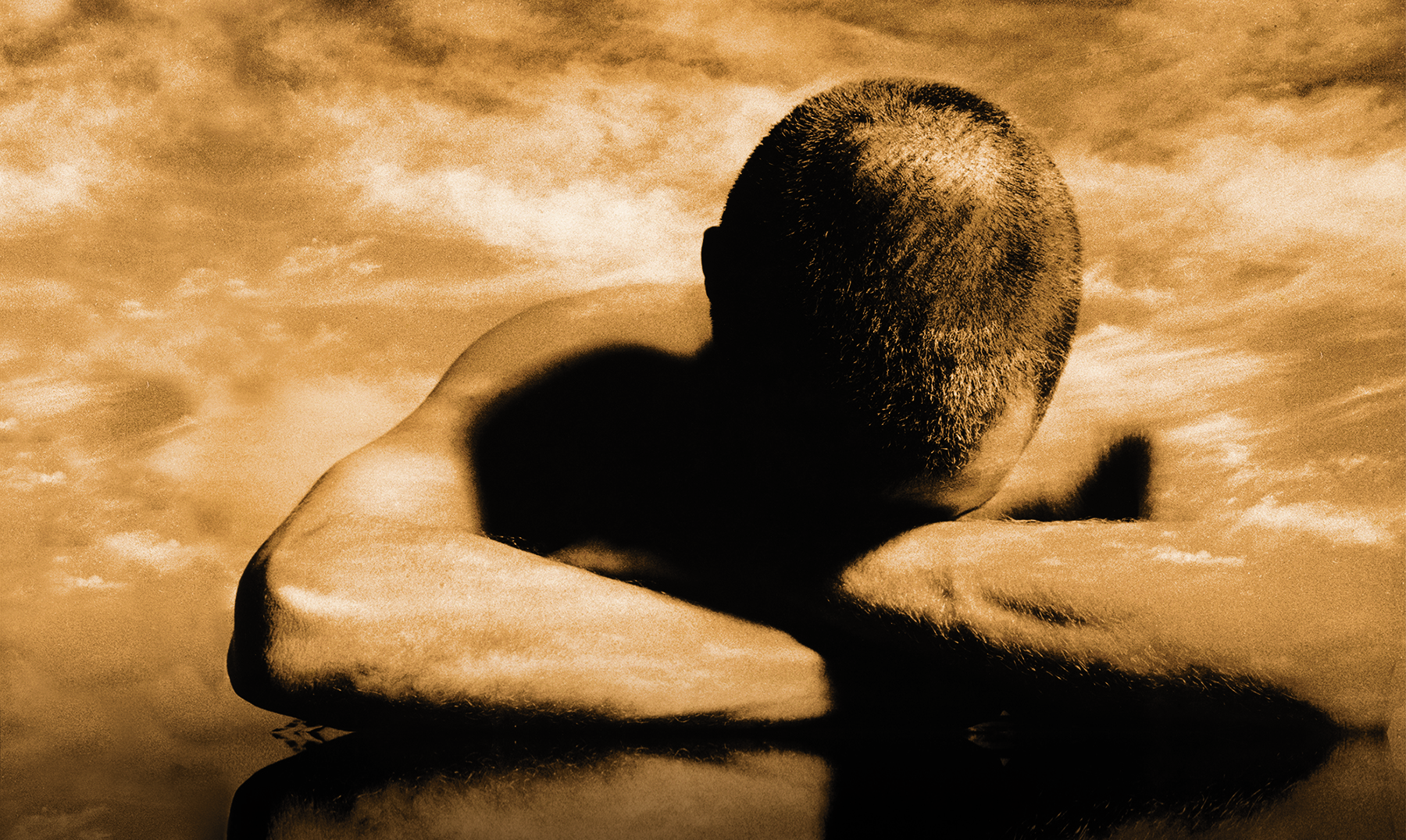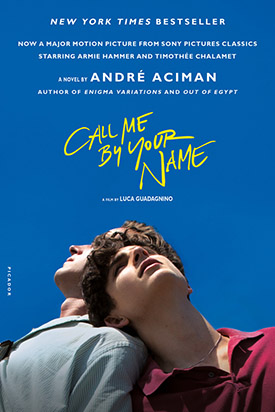Now an Oscar-nominated motion picture starring Armie Hammer and Timothée Chalamet, André Aciman’s Call Me By Your Name is a “brave, acute, elated, naked, brutal, tender, humane, and beautiful” love story (Nicole Krauss). The book traces the sudden and powerful romance that grows between an adolescent boy and a guest at his parents’ mansion on the Italian Riviera. During the restless summer weeks, obsession, fascination, and desire build and test the charged ground between them—each unprepared for the consequences of their attraction. Call Me by Your Name is about longing and intimacy, how we love others, and the painstaking process of negotiating unforeseen feelings.
“Later!” The word, the voice, the attitude.
I’d never heard anyone use “later” to say goodbye before. It sounded harsh, curt, and dismissive, spoken with the veiled indifference of people who may not care to see or hear from you again.
It is the first thing I remember about him, and I can hear it still today. Later!
I shut my eyes, say the word, and I’m back in Italy, so many years ago, walking down the tree-lined driveway, watching him step out of the cab, billowy blue shirt, wide-open collar, sunglasses, straw hat, skin everywhere. Suddenly he’s shaking my hand, handing me his backpack, removing his suitcase from the trunk of the cab, asking if my father is home.
It might have started right there and then: the shirt, the rolled-up sleeves, the rounded balls of his heels slipping in and out of his frayed espadrilles, eager to test the hot gravel path that led to our house, every stride already asking, Which way to the beach?
This summer’s houseguest. Another bore.
Then, almost without thinking, and with his back already turned to the car, he waves the back of his free hand and utters a careless Later! to another passenger in the car who has probably split the fare from the station. No name added, no jest to smooth out the ruffled leave-taking, nothing. His one-word send-off: brisk, bold, and blunted—take your pick, he couldn’t be bothered which.
You watch, I thought, this is how he’ll say goodbye to us when the time comes. With a gruff, slapdash Later!
I could grow to like him, though. From rounded chin to rounded heel. Then, within days, I would learn to hate him.
Meanwhile, we’d have to put up with him for six long weeks.
I was thoroughly intimidated. The unapproachable sort.
I could grow to like him, though. From rounded chin to rounded heel. Then, within days, I would learn to hate him.
This, the very person whose photo on the application form months earlier had leapt out with promises of instant affinities.
• • •
Taking in summer guests was my parents’ way of helping young academics revise a manuscript before publication. For six weeks each summer I’d have to vacate my bedroom and move one room down the corridor into a much smaller room that had once belonged to my grandfather. During the winter months, when we were away in the city, it became a part-time toolshed, storage room, and attic where rumor had it my grandfather, my namesake, still ground his teeth in his eternal sleep. Summer residents didn’t have to pay anything, were given the full run of the house, and could basically do anything they pleased, provided they spent an hour or so a day helping my father with his correspondence and assorted paperwork. They became part of the family, and after about fifteen years of doing this, we had gotten used to a shower of postcards and gift packages not only around Christmastime but all year long from people who were now totally devoted to our family and would go out of their way when they were in Europe to drop by B. for a day or two with their family and take a nostalgic tour of their old digs.
At meals there were frequently two or three other guests, sometimes neighbors or relatives, sometimes colleagues, lawyers, doctors, the rich and famous who’d drop by to see my father on their way to their own summer houses. Sometimes we’d even open our dining room to the occasional tourist couple who’d heard of the old villa and simply wanted to come by and take a peek and were totally enchanted when asked to eat with us and tell us all about themselves, while Mafalda, informed at the last minute, dished out her usual fare. My father, who was reserved and shy in private, loved nothing better than to have some precocious rising expert in a field keep the conversation going in a few languages while the hot summer sun, after a few glasses of rosatello, ushered in the unavoidable afternoon torpor. We named the task dinner drudgery—and, after a while, so did most of our six-week guests.
• • •
Private, chaste, unfledged, like a blush on an athlete’s face or an instance of dawn on a stormy night. It told me things about him I never knew to ask.
Maybe it started soon after his arrival during one of those grinding lunches when he sat next to me and it finally dawned on me that, despite a light tan acquired during his brief stay in Sicily earlier that summer, the color on the palms of his hands was the same as the pale, soft skin of his soles, of his throat, of the bottom of his forearms, which hadn’t really been exposed to much sun. Almost a light pink, as glistening and smooth as the underside of a lizard’s belly. Private, chaste, unfledged, like a blush on an athlete’s face or an instance of dawn on a stormy night. It told me things about him I never knew to ask.
It may have started during those endless hours after lunch when everybody lounged about in bathing suits inside and outside the house, bodies sprawled everywhere, killing time before someone finally suggested we head down to the rocks for a swim. Relatives, cousins, neighbors, friends, friends of friends, colleagues, or just about anyone who cared to knock at our gate and ask if they could use our tennis court—everyone was welcome to lounge and swim and eat and, if they stayed long enough, use the guesthouse.
• • •
Or perhaps it started on the beach. Or at the tennis court. Or during our first walk together on his very first day when I was asked to show him the house and its surrounding area and, one thing leading to the other, managed to take him past the very old forged-iron metal gate as far back as the endless empty lot in the hinterland toward the abandoned train tracks that used to connect B. to N. “Is there an abandoned station house somewhere?” he asked, looking through the trees under the scalding sun, probably trying to ask the right question of the owner’s son. “No, there was never a station house. The train simply stopped when you asked.” He was curious about the train; the rails seemed so narrow. It was a two-wagon train bearing the royal insignia, I explained. Gypsies lived in it now. They’d been living there ever since my mother used to summer here as a girl. The gypsies had hauled the two derailed cars farther inland. Did he want to see them? “Later. Maybe.” Polite indifference, as if he’d spotted my misplaced zeal to play up to him and was summarily pushing me away.
But it stung me.
Instead, he said he wanted to open an account in one of the banks in B., then pay a visit to his Italian translator, whom his Italian publisher had engaged for his book.
I decided to take him there by bike.
The conversation was no better on wheels than on foot. Along the way, we stopped for something to drink. The bar-tabaccheria was totally dark and empty. The owner was mopping the floor with a powerful ammonia solution. We stepped outside as soon as we could. A lonely blackbird, sitting in a Mediterranean pine, sang a few notes that were immediately drowned out by the rattle of the cicadas.
I took a long swill from a large bottle of mineral water, passed it to him, then drank from it again. I spilled some on my hand and rubbed my face with it, running my wet fingers through my hair. The water was insufficiently cold, not fizzy enough, leaving behind an unslaked likeness of thirst.
What did one do around here?
Nothing. Wait for summer to end.
I liked having my mind read.
What did one do in the winter, then?
I smiled at the answer I was about to give. He got the gist and said, “Don’t tell me: wait for summer to come, right?”
I liked having my mind read. He’d pick up on dinner drudgery sooner than those before him.
“Actually, in the winter the place gets very gray and dark. We come for Christmas. Otherwise it’s a ghost town.”
“And what else do you do here at Christmas besides roast chestnuts and drink eggnog?”
He was teasing. I offered the same smile as before. He understood, said nothing, we laughed.
He asked what I did. I played tennis. Swam. Went out at night. Jogged. Transcribed music. Read.
He said he jogged too. Early in the morning. Where did one jog around here? Along the promenade, mostly. I could show him if he wanted.
It hit me in the face just when I was starting to like him again: “Later, maybe.”
I had put reading last on my list, thinking that, with the willful, brazen attitude he’d displayed so far, reading would figure last on his. A few hours later, when I remembered that he had just finished writing a book on Heraclitus and that “reading” was probably not an insignificant part of his life, I realized that I needed to perform some clever backpedaling and let him know that my real interests lay right alongside his. What unsettled me, though, was not the fancy footwork needed to redeem myself. It was the unwelcome misgivings with which it finally dawned on me, both then and during our casual conversation by the train tracks, that I had all along, without seeming to, without even admitting it, already been trying—and failing—to win him over.
When I did offer—because all visitors loved the idea—to take him to San Giacomo and walk up to the very top of the belfry we nicknamed To-die-for, I should have known better than to just stand there without a comeback. I thought I’d bring him around simply by taking him up there and letting him take in the view of the town, the sea, eternity. But no. Later!
André Aciman is the author of Eight White Nights, Out of Egypt, False Papers, Alibis, and Harvard Square, and the editor of The Proust Project (all published by FSG). He teaches comparative literature at the Graduate Center of the City University of New York and lives with his wife in Manhattan.

